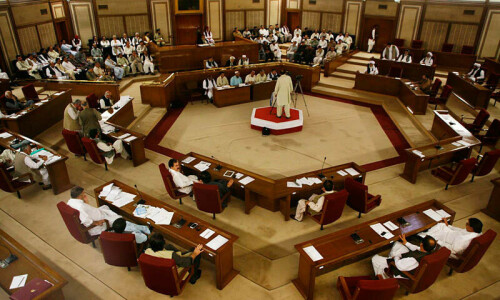WILL it hold? That is the question many in the Middle East and beyond will be asking after a 60-day ceasefire between Lebanon’s Hezbollah and Israel took effect early on Wednesday. The two sides had been locked in battle after the pro-Iran Lebanese armed group started targeting Israeli positions soon after the Hamas attacks on Oct 7 last year. Clearly, Hezbollah has softened its position, as the group had earlier said that its guns would not fall silent unless there was a truce in Gaza as well. That has obviously not materialised. However, Israel’s brutal attacks on Lebanon were piling pressure upon Hezbollah to agree to a ceasefire. Much of the group’s senior political and military leadership had been wiped out by Israel, while Tel Aviv’s aggression has resulted in the uprooting of over a million Lebanese, with over 3,700 people killed, many of them civilians; most of the fatalities have occurred over the past few months. Yet despite Tel Aviv’s murderous assaults, Hezbollah remains active, firing missiles into the Zionist state and defending Lebanese territory from Israeli invaders. In fact, a key reason for Israel to agree to the ceasefire was that it was facing firm resistance in Lebanon as it conducted its slaughter in Gaza.
Though it is hoped that long-term peace is achieved through the ceasefire, realistically speaking, this appears to be more of a tactical break for both sides. That is because the underlying factors fuelling tensions remain unaddressed, while Israel has been known to use the slightest excuse to relaunch its wars of aggression. Primarily, Tel Aviv’s genocidal campaign in Gaza continues, while extremists in Israel are drawing up plans of devouring the West Bank. Moreover, while speaking before the Lebanon ceasefire took effect, Israeli Prime Minister Benjamin Netanyahu said the truce would allow his regime to focus on the “Iranian threat”. These are not the words of a government suing for peace. The only way for there to be durable calm in the region is for Israel to immediately halt its butchery in Gaza, respect the sovereignty of its neighbours, and commit to a Palestinian state. As things stand, there is little hope of Tel Aviv committing to any of these conditions, which is why more conflict is likely, especially as a zealously pro-Israel administration takes the reins in Washington in January.
Published in Dawn, November 28th, 2024












































Dear visitor, the comments section is undergoing an overhaul and will return soon.